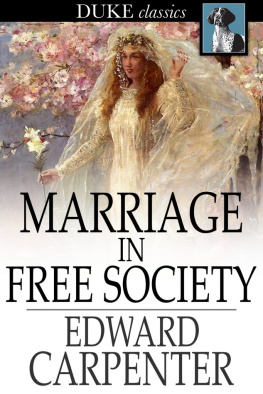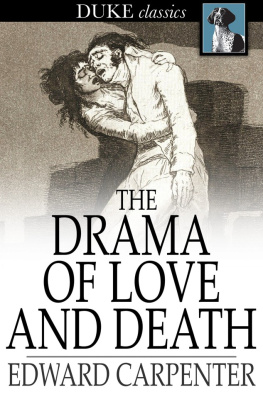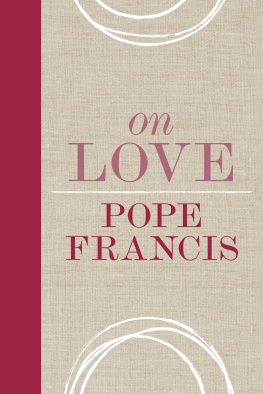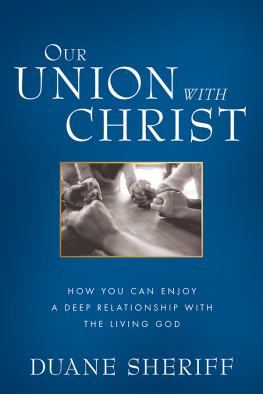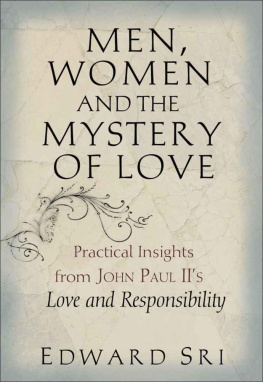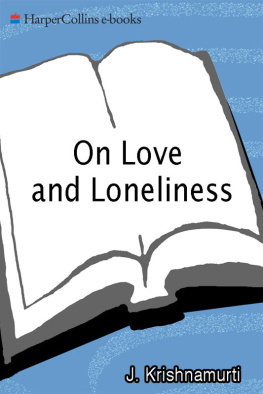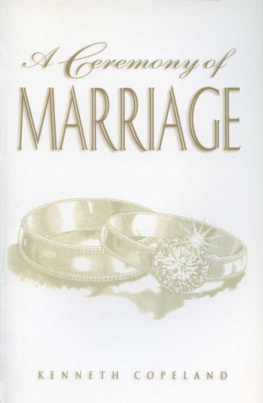By Edward Carpenter
1894
MARRIAGE
OF the great mystery of human Love, and that most intimate personal relation of two souls to each otherperhaps the firmest, most basic and indissoluble fact (after our own existence) that we know; of that strange senseoften, perhaps generally, instantaneousof long precedent familiarity and kinship, that deep reliance on and acceptation of another in his or her entirety; of the tremendous strength of the chain which thus at times will bind two hearts in lifelong dedication and devotion, persuading and indeed not seldom compelling the persons concerned to the sacrifice of some of the other elements of their lives and characters; and, withal, of a certain inscrutable veiledness from each other which so frequently accompanies the relation of the opposite sexes, and which forms at once the abiding charm, and the painsometimes the tragedyof their union; of this palpitating winged living thing, which one may perhaps call the real MarriageI would say but little; for indeed it is only fitting or possible to speak of it by indirect language and suggestion, nor may one venture to rudely drag it from its sanctuary into the light of the common gaze.
Compared with this, the actual marriage, in its squalid perversity as we too often have occasion of knowing it, is as the wretched idol of the savage to the reality which it is supposed to represent; and one seems to hear the Aristophanic laughter of the gods as they contemplate man's little clay image of the Heavenly Lovewhich, cracked in the fire of daily life, he is fain to bind together with rusty hoops of law, and parchment bands, lest it should crumble and fall to pieces altogether.
The whole subject, wide as life itselfas Heaven and Helleludes anything like adequate treatment, and we need make no apology for narrowing down our considerations here to just a few practical points; and if we cannot navigate upward into the very heart of the matternamely, into the causes which make some people love each other with a true and perfect love, and others unite in obedience to but a counterfeit passionyet we may fairly, I imagine, and with profit, study some of the conditions which give to actual marriage its present form, or which in the future are likely to provide real affection with a more satisfactory expression than it has as a rule to-day.
Yet the subject, even so limited, is one on which it is extremely difficult to get a calm audience. Marriage customs (however much they may differ from race to race) are at any one time and among any one folk remarkably tenacious, being sanctioned by almost a violence of public opinion; and as in the case of theology or politics, their mere discussion is liable to infuriate peopleperhaps from the very fact that the subject is so complex and so deeply rooted in personal feeling. Neverthelesssince alterations have to take place in these as in other customs, and since, as many things indicate, we are moving towards a distinct period of change in matters matrimonialit would seem that the more rationally we can survey these questions beforehand, the better.
It will probably be felt that certain present difficulties in the marriage-relation are not merely casual or local, but are deeply intertwined with a long series of historical causes, which have led up to that exaggerated differentiation, and consequent misunderstanding, between the sexes, of which we have spoken in a former paper.* Behind the relation of any individual man and woman to each other stands the historical age-evolved relation of the two sexes generally, spreading round and enclosing the former on all sides, and creating the social environment from which the individuals can hardly escape. Two young people in the present day may come together, but their relation is already largely determined by causes over which they have no control.
* Woman: Labour Press Society, Manchester.
As a rule they know but little of each other; society has kept the two sexes apart; the boy and the girl have been brought up along different lines; they hardly understand each other's nature; their mental interests and occupations are different; and as they grow up their worldly interests and advantage are seen to be different, often opposed; public opinion separates their spheres and their rights and their duties, and their honor and their dishonor* very sharply from each other. The subject of sex is a sealed book to the girl; to the youth it is possibly a book whose most dismal page has been opened first; in either case with its very mention is probably connected a painful and irrational sense of wickedness.
In this state of confusion of mind, of mutual misunderstanding, and often of suffering, the Sex-glamor suddenly descends upon the two individuals and drives them into each other's arms. It envelopes in a gracious and misty halo all their differences and misapprehensions. They marry without misgiving; and their hearts overflow with gratitude to the white-surpliced old gentleman who reads the service over them. It is only at a later hour, and with calmer thought, that they realise that it is a life-sentence which he has so suavely passed upon themnot reducible (as in the case of ordinary convicts) even to a term of 20 years.
* See Webster's Dictionary, which gives as one of the
meanings of Honor, "any particular virtue much valued, as
bravery in men and chastity in females."
The married life, in so strange and casual a way begun, or drifted into, is hardly, one might think, likely to turn out well. Sometimes, of course, it does; but in many cases, perhaps the majority, there follows a painful awakening. A brief burst of satisfaction, accompanied, probably through sheer ignorance, by gross neglect of the law of transmutation; satiety on the physical plane, followed by vacuity of affection on the higher planes, and that succeeded by boredom, and even nausea; the girl, full perhaps of a tender emotion, and missing the sympathy and consolation she expected in the man's love, only to find its more materialistic side"This, this then is what I am wanted for." The man, who looked for a companion, finding he can rouse no mortal interest in his wife's mind save in the most exasperating trivialities;whatever the cause may be, a veil has fallen from before their faces, and there they sit, held together now by the least honorable interests, the interests which they themselves can least respect, but to which Law and Religion lend all their weight. The monetary dependence of the woman, the mere sex-needs of the man, the fear of public opinion, all form motives, and motives of the meanest kind, for maintaining the seeming tie; and the relation of the two hardens down into a dull neutrality, in which lives and characters are narrowed and blunted, and deceit becomes the common weapon which guards divided interests.
A sad picture! and of course in this case a portrayal deliberately of the seamy side of the matter. But who shall make light of the agonies often gone through in those first few years of married life?
It may be saidand often of course is saidthat such cases as these only prove that marriage was entered into under the influence of a passing glamor and delusion, and that there was not much real devotion to begin with. And no doubt there is truth enough in such remarks. Butwe may say in replybecause two young people make a mistake in youth, to condemn them, for that reason, to lifelong suffering and mutual degradation, or to see them so condemned, without proposing any hope or way of deliverance, but with the one word "serves you right" on the lips, is a course which can commend itself only to the grimmest and dullest Calvinist. Whatever safe-guards against a too frivolous view of the relationship may be proposed by the good sense of society in the future, it is certain that the time has gone past when Marriage can continue to be regarded as a supernatural institution to whose maintenance human bodies and souls must be indiscriminately sacrificed; a humaner, wiser, and less panic-stricken treatment of the subject must set in; and if there are difficulties in the way they must be met by patient and calm consideration of human welfaresuperior to any law, however ancient and respectable.


